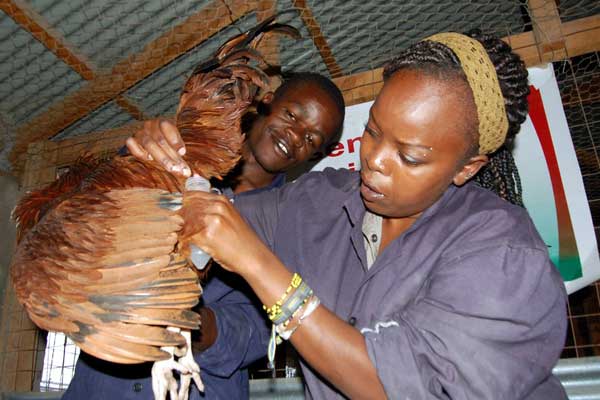Best Hybrid and Feeds for Layers
For hybrid layer birds, consider the Issa Brown, which you can source from Kenchic. In management, provide supplemental heating using infra-red bulbs for the first four weeks of the chick’s life. Vaccination procedure should be as follows; New Castle Disease at day 7, Gumboro at day 14, fowl typhoid at week 9, fowl pox at week 18 and de-worm at 19 weeks just before laying begins and thereafter, de-worm after every six months. Provide chick mash of 35-75g/chick/day between 0-7 weeks of age. This should be increased gradually such that the birds are fed 75g/bird/day by the 6th week. Introduce growers mash gradually during the 7th week, thereafter provide 75-110g/bird/day of growers mash until 20 weeks of age. Finally the adults should be fed 110-140g/bird/day of layers mash. Ensure feed is of good quality, consider Unga/Pembe Feeds. Avoid abrupt changes in source of feed and feeding times. These factors greatly affect egg production. Provide clean water daily.
Chicken Feasting on Eggs
The hens are poor brooders, which may be due to hormonal imbalances or their breed type. If you rely on natural incubation of eggs to multiply your flock, consider finding a broody hen to be used as a foster brooder or induce broodiness in your hens by having a nest box in a quiet and dim area. For the kuchi chicken, the aggressive behaviour is mostly considered genetic and as such you should simply separate them from chicks and, as a caution, do not put the males together. Instead use them for mating by giving each male its own females to avoid unnecessary fighting (one male to five females).
Feather Pecking Chicken
I have been keeping some chicken, and of late I have realised that some of them feed on their feathers. What could be the cause of this? This condition is known as feather pecking and it usually starts with back feathers, and may progress to the tail and the whole body. Feather pecking is mostly a consequence of poor housing conditions that result in bullying. The predisposing factors include overcrowding, excessive light and temperature, insufficient or improperly placed feeder or drinking space. Chicken are by nature territorial and as such consideration must be given to the stocking density. In addition to environmental conditions, the other probable factor is nutritional imbalances such as mineral deficiencies, like sodium which is common in cases where the birds lack salt in their diet. Amino acid (methionine) deficiency, feeding high energy diets with low fibre are also likely to result in feather pecking.
Coughing Chicken
Consider your ventilation conditions and dust within the poultry house, also factor in the condition of the litter material if being used. These are some of the factors that predispose your birds to respiratory disease which will continue being a nuisance if the birds are kept in poor environmental conditions. Once these factors have been corrected, consider a broad-spectrum anti-biotic (tetracycline) which you can source from the agro-vets to help control the pathogens infecting your birds respiratory system.










